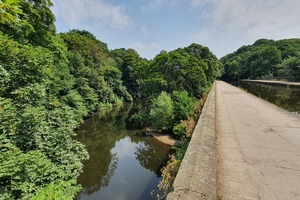Environment Agency encourages landowners to introduce natural flood management techniques in the River Aire catchment
The Environment Agency, Leeds City Council and the White Rose Forest partnership are calling for landowners to introduce natural flood management measures on their land to help mitigate climate change and reduce the risk of flooding in the River Aire catchment, from Malham to Leeds.

The River Aire as it passes beneath the Leeds & Liverpool canal near Dowley Gap
White Rose Forest partners are now available to work with landowners or farmers to identify potential opportunities for natural flood management work on their land and guide them through the design and practical support they need to complete each project – all of which is fully-funded.
Natural flood management measures can help to reduce flood risk by mimicking natural processes and slowing the flow of water. These measures are generally divided into three main categories: river and floodplain management; woodland management; and run-off management. Some examples include: tree and hedgerow planting; buffer strips (which trap sediment and slowing water flow); leaky barriers (which enhance floodplain storage); woodland creation; and sediment traps.
Fiona Sugden, Environment Agency Project Manager, said:
There is a long history of flooding in the Lower Aire catchment which has a huge effect on local residents, the environment and wildlife. The Leeds Flood Alleviation Scheme’s Natural Flood Management Programme plays an important role in reducing flood risk and bringing wider environmental and social benefits to the area.
The project has seen huge successes so far and we are keen for more landowners to get in touch to find out more about the benefits of introducing natural flood management measures on their land.
This scale of natural flood management will provide several wider environmental and social benefits to the area, such as: increasing biodiversity, tree canopy cover and creating habitat for wildlife, capturing and storing carbon, improved land management, better water quality and helping to regenerate rural and urban areas.
Ian Coldwell, Project Manager for the White Rose Forest said:
This natural flood management project is important for nature, our environment and everyone living in the River Aire catchment. We are working with our network of local White Rose Forest partners to invite interested landowners across the Aire valley to find out more about the support available for natural flood management projects on their land.
A complete package of design, funding, and delivery is available to make each project as simple and straight forward as possible for landowners. Although the scheme runs throughout the year, we would encourage landowners to register their interest early via the White Rose Forest website to ensure timely delivery, particularly for popular projects such as tree planting.
Councillor Helen Hayden, Leeds City Council’s executive member for infrastructure and climate, said:
Natural flood management techniques can play a key role in improving our area’s resilience to climate change. In conjunction with the engineering work being carried out also through the Leeds Flood Alleviation Scheme it could significantly reduce the flood risk to previously affected residents and businesses in Leeds.
The council has an ambitious target of planting up to two million trees, which will contribute significantly to our area’s resilience and we know natural flood management also has environmental benefits, which is why it is so important.
As well as reducing flood risk, landowners or land managers could benefit from;
- improved soil fertility and reductions in soil loss, pesticide and fertiliser runoff
- reduced effects of dry weather
- improved drainage of waterlogged areas
- bankside fencing can reduce the risk of waterborne disease and lameness in stock
- hedges and tree planting can provide shelter and shade for stock
- reduced erosion of tracks and river banks
- less need for gravel management
- potential income generation from commercial woodlands and short rotation willow coppice
This initiative follows on from natural flood management projects recently undertaken by the Environment Agency as part of the Leeds Flood Alleviation Scheme’s Natural Flood Management Project on behalf of Leeds City Council. Funded by Leeds City Council, this is one of the UK’s largest natural flood management schemes which aims to use natural processes to slow the flow and build a more resilient river catchment that can respond better to extreme weather.
Broughton Hall Estate near Skipton is one of the sites where natural flood management techniques are currently being used with support from the White Rose Forest and funding from Defra’s ‘Nature for Climate’ fund. Work so far this year has included restructuring several areas of woodland, installing leaky barriers and land restoration, as well as the creation of up to 110,000 cubic meters of storage space for surface water.
If you have land and would like to know more visit the White Rose Forest website on www.whiteroseforest.org/aireriver or email whiteroseforest@kirklees.gov.uk.
For more information about the LeedsFAS visit www.leeds.gov.uk/fas.